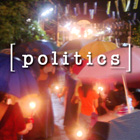
|
'RIGHT' ENTRENCHED & 'LEFT' AT LARGE: The terms Left and Right have been assigned in broad strokes to sometimes sweeping political visions, sometimes petty differences in policy direction, yet rarely is there a clearly defined composition which can be consistently labeled as one or the other. The terms originate in 18th century revolutionary French politics, and first emerged as a reference to where in the Legislative Assembly the respective political views' supporters were seated. In the beginning, the "Left" was characterized by its opposition to the ancien régime, and so was associated with views toward mercantilism, laissez-faire capitalism, free markets and democratic systems; the "Right", by contrast, signified loyalists to the feudal structure of the ancien régime, and so monarchists, religious traditionalists and promotion of the aristocracy. While the terms still carry much of the rhetorical thrust of their origins, i.e., loyalty to consolidated power or a vision of diffused wealth and influence, they have come to refer to the opposite of their original meaning, at intervals. The "Right" is now associated with free market policies and laissez-faire capitalism, but those systems are often preferred by entrenched ruling political elites; the "Left" has come to be associated with progressive tax policies and socialized government programs, handing more power to the state in an effort to use that power to protect the average citizen. In contemporary political trends, and over much of the 20th century, movements on the Right and the Left have been distorted into excuses or pretexts for instituting hardline authoritarian systems, usually based on the need to eradicate all traces of the other side of this peculiar and ill-defined centuries' old debate... both have been used to militarize or to justify political disappearances and killings. But in western industrialized democracies, the terms rarely refer to violent political factions, and are more often applied by one side as a label intended to pigeon-hole and undermine the other. Politicians who disagree with free market policies or want new rights for minority groups will label those hostile to their aspirations "rightwing", while those most determined to eliminate government regulation of industry, reduce taxes on business or cut social programs will label their opponents as "leftist". But, it is instructive to look back to the times of the French Revolution. The Montagnards who sat on the original left and the Monarchiens (who were not opposed to the revolution entirely, but sought instead a constitutional monarchy, in which the long-standing instruments of social influence —church and monarchy— would continue to play a role) favored liberalizing the French economy, to bring it up to date with burgeoning industrialization. While it is necessary to say that the terms have survived and evolved precisely because they have been found useful in human society, it is also true that even their earliest use appears to demonstrate their referring more accurately to factional loyalties than to the particular ideological goals of one policy or another. The general rhetorical thrust of the terms is probably best illustrated by the type or meaning of proposed change embraced by a given group to which either term is ascribed: the Left tends to seek new rules and new structures within which to push for some vision of general equality among citizens, while the Right is thought to view such aspirations with skepticism. For that reason, the term "reactionary" (also born in the wake of the French Revolution) is often applied by those critical of so-called "rightwing" policies. The embodiment of the Right as "reactionary" is a critical or disparaging view, meant to highlight the apparent desire of those so classified to turn back progressive social policies or remove protections for those who are not part of a privileged or ruling class. The history of 19th century European politics is peppered with flare-ups in factional violence and failed constitutions aimed at instituting the views of either Right or Left to the exclusion of the other. Some descriptions of these factions note the tendency of "reactionary" policies to be limited to moments of repression or of experimental authoritarianism, but generally with the classification of forming part of the political "Right". "Conservatives", then, were those who stood to the relative left of the "reactionaries" on the political spectrum, and "liberals" were still further left, being those who pushed for social progress, a movement away from the ancien regime (in whatever its manifestation in each affected society across the continent). The term "Leftist" has been particularly damaged by those who laid claim to the ideals associated with it. Communism as a system was associated throughout the 19th century, and through numerous revolutions, with the Left, but in the 20th century gave rise to serious violations of basic liberties and human rights. For that reason, those who presently associate with the Left of the spectrum of political ideas tend to reject the Stalinist claim to being "leftist", precisely because it imposed the revocation of basic liberties and civil rights. [For more: Wikipedia] |
||||||
|
|||||||



